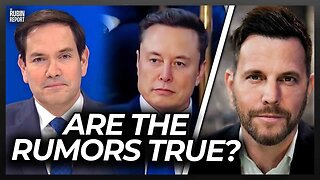Premium Only Content

Assessing the Impact of the UN's Pact for the Future on U.S. Sovereignty and Global Governance"
The recent adoption of the Pact for the Future by the United Nations has ignited significant debate regarding its implications for global governance, particularly concerning the role of the United States within this framework. This pact, aimed at reforming international governance to address pressing global challenges, raises critical questions about sovereignty, the balance of power, and potential consequences for American domestic and foreign policy.
The Pact for the Future, proposed by UN Secretary-General António Guterres and adopted by 193 member states during the UN General Assembly, seeks to revitalize multilateral cooperation in response to a range of global issues. These issues include climate change, digital governance, and peacekeeping. The pact emphasizes collective action and shared responsibility among nations to tackle challenges that transcend borders. It includes commitments to enhance climate finance, regulate emerging technologies, and promote sustainable development goals (SDGs), all while addressing the inadequacies of existing international structures.
The motivations behind this pact stem from a growing recognition that unilateral approaches to global challenges have proven insufficient. The increasing complexity of issues such as cybersecurity threats, pandemics, and geopolitical tensions necessitates a coordinated response. Furthermore, there is a palpable urgency among many nations to reform outdated governance structures that have not adapted to contemporary realities. Leaders argue that current frameworks disproportionately favor a select few countries while neglecting broader global needs.
Should the U.S. formally engage with the Pact for the Future, several potential implications could arise. One of the primary concerns surrounding international agreements is the perceived erosion of national sovereignty. Critics argue that commitments made under such pacts could compel the U.S. to align its policies with international norms that may conflict with domestic interests. For instance, provisions related to climate finance and digital governance could require significant changes in U.S. policy frameworks and regulatory approaches.
Engagement with the UN under this pact could also lead to shifts in global power dynamics. By participating actively in multilateral negotiations, the U.S. might bolster its influence in shaping international norms; however, it risks ceding some control over its foreign policy decisions to collective agreements. The involvement of emerging powers in these discussions could further complicate traditional power structures within international relations.
Domestically, support or opposition to such a pact could become a polarizing issue in U.S. politics. Proponents may argue that active participation enhances America's leadership role on the world stage and addresses global challenges effectively. In contrast, opponents may view it as an infringement on national sovereignty and an unnecessary entanglement with international bureaucracy. This divide could influence electoral outcomes and shape future U.S. foreign policy.
In the long term, if such a situation arises where the UN assumes greater control over global governance mechanisms involving the U.S., it could lead to increased scrutiny from both domestic constituents and international observers. The effectiveness of such governance would depend on how well it addresses pressing issues like climate change and security without undermining national interests.
The adoption of the Pact for the Future represents a pivotal moment in international relations and governance. While it aims to foster cooperation among nations in addressing shared challenges, its implications for U.S. sovereignty, global power dynamics, and domestic politics warrant careful consideration. As discussions continue regarding America's role within this framework, stakeholders must weigh both the potential benefits of multilateralism against the risks associated with ceding authority to international bodies. The outcome will significantly shape not only U.S. foreign policy but also its standing in an increasingly interconnected world.
-
 LIVE
LIVE
The Dan Bongino Show
2 hours agoThe Left Can't Meme And Can't Win (Ep. 2438) - 03/10/2025
108,395 watching -
 LIVE
LIVE
The Rubin Report
37 minutes agoTrump Addresses Rumors of Elon Musk & Rubio Clashing in Cabinet Meeting
1,677 watching -
 LIVE
LIVE
Steven Crowder
2 hours ago🔴 Trudeau Out, Carney In: Who Is Canada’s Anti-Trump Puppet?
75,041 watching -
 1:04:31
1:04:31
Timcast
1 hour agoDemocrat Machine IMPLODING, Biden AUTOPEN Scandal & ActBlue's COLLPASE Signal END Of Deep State
14.6K23 -
 LIVE
LIVE
Benny Johnson
19 minutes agoTrump Orders BLM Plaza DISMANTLED in DC, DHS Launches DEPORTATION App | Secret Service KILL Gunman!?
2,978 watching -
![🔴[LIVE TRADING] Stock Market Crash News & Predictions || The MK Show](https://1a-1791.com/video/fwe2/34/s8/1/i/K/j/r/iKjry.0kob-small-The-MK-Show-Mar.-10th.jpg) LIVE
LIVE
Matt Kohrs
12 hours ago🔴[LIVE TRADING] Stock Market Crash News & Predictions || The MK Show
1,794 watching -
 LIVE
LIVE
LFA TV
20 hours agoKASH AFRAID FOR HIS LIFE! | LIVE FROM AMERICA 3.10.25 11AM
3,065 watching -
 LIVE
LIVE
The Big Mig™
11 hours agoAnother Trump Assassination Attempt ?
2,512 watching -
 LIVE
LIVE
Bannons War Room
20 days agoWarRoom Live
26,018 watching -
 45:55
45:55
BonginoReport
3 hours agoTulsi was Right: Christians Murdered in Syria (Ep.156) - 03/10/2025
62K129